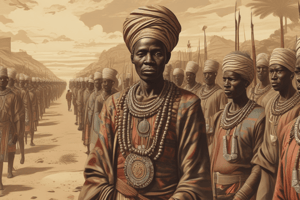Podcast
Questions and Answers
What is the fundamental shift involved in modernization?
What is the fundamental shift involved in modernization?
- Shift from barter system to currency-based economy
- Shift from traditional to advanced societal structures (correct)
- Shift from monarchy to democracy
- Shift from rural to urban living
Which concept emerged as a crucial idea in the mid-20th century amongst social scientists and policy makers?
Which concept emerged as a crucial idea in the mid-20th century amongst social scientists and policy makers?
- Industrial Revolution
- Globalization
- Modernization (correct)
- Colonialism
What is a prominent catalyst for the evolution of modernization discussed in Class 11 History?
What is a prominent catalyst for the evolution of modernization discussed in Class 11 History?
- Colonialism (correct)
- Industrial Revolution
- Renaissance
- Enlightenment
What period is typically covered in modern history as explored in Class 11 History?
What period is typically covered in modern history as explored in Class 11 History?
Which event is NOT part of the transformative events in modern history?
Which event is NOT part of the transformative events in modern history?
Which facet is NOT encompassed within the societal transformation of modernization?
Which facet is NOT encompassed within the societal transformation of modernization?
What is colonialism?
What is colonialism?
How did colonial rule impact the colonized world?
How did colonial rule impact the colonized world?
What is globalization primarily characterized by?
What is globalization primarily characterized by?
In what ways has globalization impacted modernization?
In what ways has globalization impacted modernization?
Which statement best describes the relationship between colonialism and modernization?
Which statement best describes the relationship between colonialism and modernization?
Why is understanding the evolutionary paths of modernization important?
Why is understanding the evolutionary paths of modernization important?
Flashcards are hidden until you start studying
Study Notes
The Evolutionary Paths of Modernization in Class 11 History
Modernization, a complex, multifaceted process, has shaped various aspects of human society throughout history. To understand this transformation, particularly in the context of Class 11 History, we'll explore its interplay with modern history and its two prominent catalysts: colonialism and globalization.
Modernization
Modernization is the fundamental shift from traditional to more advanced societal structures, focusing on economic, technological, and political developments. This societal transformation encompasses several facets, such as urbanization, industrialization, democratization, and the growth of free-market economies. The term "modernization" emerged as a concept in the mid-20th century, especially amongst social scientists and policy makers.
Modern History and Class 11 History
Modern history, specifically in Class 11 History, typically covers the period from the 16th century to the present day. This period is marked by several transformative events, including the Age of Discovery, European colonization, the Industrial Revolution, decolonization, and the rise of globalization. Understanding this dynamic era and its various facets is crucial for comprehending the evolution of modernization.
Colonialism
One of the most significant influences on modernization, colonialism refers to the expansion and domination of one nation over another, often with the intent to exploit resources, spread religion, and establish political control. Colonial rule, imposed by European powers, brought about vast changes in the colonized world, including the introduction of Western-style institutions, new economic systems, and the development of infrastructure. Although the colonial era was a period of immense hardship and suffering for many, it also fostered modernization in several regions by facilitating technological advancements, urbanization, and cultural exchange.
Globalization
Globalization, a term coined in the late 20th century, describes the rapidly increasing interconnectedness of the world's economies, cultures, and societies. Key aspects of globalization include the rise of multinational corporations, the growth of international trade, the expansion of communication and transportation networks, and the spread of technology and information. Globalization has accelerated the pace of modernization, facilitating the sharing of knowledge, ideas, and resources among nations. While globalization has brought many benefits, it has also exacerbated inequality, fueled political and cultural conflicts, and raised concerns about its impact on the environment.
Conclusion
Understanding the evolutionary paths of modernization in Class 11 History, particularly in light of colonialism and globalization, is essential for comprehending the complex interplay between economic, technological, and political developments. Modernization has brought about significant changes to society, yet it has also raised concerns about inequality, environmental degradation, and cultural homogenization. By exploring the historical, economic, and political aspects of modernization, we can better understand its profound impact on the past and present, and perhaps gain insight into the future of our global community.
Studying That Suits You
Use AI to generate personalized quizzes and flashcards to suit your learning preferences.




